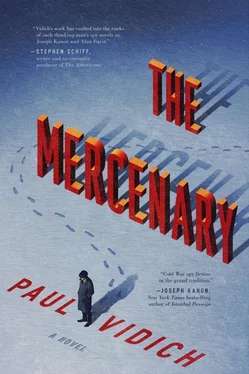“Madame Chairman, am I guilty of sympathizing with dissident, anti-Soviet individuals who dismiss the false rhetoric of the State and risk their lives to speak out? Yes, I am guilty of that compassionate mistake. But who among us does not see the hypocrisy?
“Madame Chairman, I consider myself responsible for one crime against the Socialist Fatherland and the International Proletariat. It is the crime of ambition. I have advanced myself at the expense of other men, and perhaps I have slandered good men in the hopes the slanders would poison their careers. And who among us has not coveted a promotion?
“But, Madame Chairman, I am not guilty of treason. I have not passed military secrets to foreign agents. I have not provided the CIA with photocopies. And I have not dishonored my loyalty to the State by compromising our national defense. All the evidence against me is circumstantial, except for the one piece of paper—an anonymous, numbered bank account—the meaning of which has been twisted against me. I am supposed to have created a cover for my treason by making it appear that I paid Garin money when, in fact, I was receiving money—again, through an anonymous, numbered account. That is what the prosecutor would have you believe. It is a fabrication, an atrocity. I deny it. Garin denies it. There is no proof of money I received. There is no proof I owned the account. And the claim that I used a copier is unsubstantiated. Tens of dozens of people have access to that copier. To the charge that I provided copies and received payment, there is not one scrap of evidence. Not one. I didn’t pass military secrets.”
Posner had shouted his speech. He stood rigid and looked at the judge. Then he pointed at the witness table. “I have here a woman, a decorated KGB officer, who helped recruit Garin to work for the KGB.”
The judge turned to the witness table. “What do you have to say?” she asked. “Speak.”
Natalya rose from her chair, tall, poised, and dignified in her uniform. She commanded the attention of the room. Her hands were at her side when she turned to the judge. She gave her name, her rank, and her responsibilities in the KGB. She was subdued as she spoke, and her description of the events necessarily involved describing Garin.
“He was a target,” she said. “We knew he was vulnerable. There was intelligence from within the embassy that his work on human rights was a cover. We suspected that he worked for the CIA.”
Natalya did not look at Garin as she spoke. Her voice remained flat, almost hostile, when she described the events of the evening at the Bolshoi Theater and then dinner afterward. “He was cautious but drank too much. I brought him to the designated house where, by previous arrangement, KGB officers were stationed, and this man was compromised. Of course, he was surprised, and he became angry. It was clear that he was upset, and he had no interest in cooperating with Comrade Posner.”
The judge leaned forward. “What did you expect to learn from him?”
“We wanted to recruit him,” Posner interrupted. He had moved away from the defense table and stood between the judge and his witness. “He was an important target.”
“Go on,” the judge said to Natalya.
“We knew he had information on the death of General Viktor Zyuganov, and that case remains unsolved.” Natalya stopped. “It was settled, but questions remain. Garin was an important target to turn, but his value was also in what he knew about General Zyuganov.”
She looked at Talinov. Her eyes were dark embers, fixed and accusing, but her voice was calm. “That man,” she said, “Lieutenant Colonel Talinov, executed General Zyuganov. Zyuganov was a patriot who uncovered evidence of corruption in the KGB, and he was falsely accused of sedition. He was executed by that man before he could make a defense.”
Natalya paused. “Forgive my emotion,” she said. “I have known Comrade Dmitry Posner since I was a young girl. I have the highest admiration for him. We recruited the American Garin in an authorized operation to develop him as a source inside the CIA. I conclude my testimony.”
“Did Garin mention Lieutenant Colonel Talinov?” the judge asked.
“No.”
“Who authorized the action against Garin?”
“I don’t know. Someone higher up.”
“But you don’t know?”
“No. It wasn’t required that I know.”
“But did you ask?”
“No.”
“So, you don’t know if it was authorized?”
Natalya turned to Posner, her eyes searching.
The judge prodded, “You don’t know if it was authorized?”
Natalya turned to the judge. “No, I did not know that.”
“Thank you. You may sit down.”
An agitated Rostov popped up, like a jack-in-the-box. “It wasn’t authorized, Madame Chairman!” he shouted. “Defendant Posner misled her, as he is trying to mislead this court.”
Rostov lifted several stapled pages and waved them theatrically over his head. “To exonerate himself he would have us believe he is the target of a corrupt rival who has slandered him. He has submitted evidence to this court, which I hold here. This document from KGB archives suggests that General Zyuganov was not working for the CIA—and we must then conclude that he was wrongly accused of treason by Lieutenant Colonel Talinov. Defendant Posner would have us believe that he too has been wrongfully accused by Comrade Talinov. This document claims that General Zyuganov was sent to Vyborg to meet an English MI6 agent who Zyuganov had recruited during his two-year posting in London. General Zyuganov was not defecting; he was secretly recruiting a senior MI6 officer. But there is a problem,” he said, his voice rising.
“This six-year-old document is a forgery. Long-lived cotton-fiber paper used by the KGB for classified reports contains an almost invisible date-code watermark to protect the integrity of the document from fraud. The date-code on this document is March 27 of this year. How does a six-year-old document come to have last month’s date-code?” Rostov looked around the courtroom and let his question hang in the air. He waved the document.
“It is a counterfeit. A well-done counterfeit. Three men know it is a forgery. The alert KGB technician who spotted the incriminating mistake, the American forger who created this evidence, and defendant Posner. An ingenious forgery, yes, but the mistake usurps its ingenuity.”
Garin gazed at Posner, feeling no compassion.
Rostov continued: “This document is final proof of defendant Posner’s treason. A forgery created for him by the CIA. He would have you believe he is an ordinary victim of human failings when, in fact, he is working for the CIA. Duty, honor, country. Hollow words from his foul mouth. He has betrayed the State just as he betrayed General Zyuganov.”
Natalya’s face was ashen, and she looked stricken, as if day had become night. She stood at the witness table until a guard took her arm and escorted her from the courtroom. She stared at Posner in disbelief. She continued to look at him as she was hustled out of the room.
* * *
TALINOV WAS SUMMONED to the witness table. “Our first suspicion that Posner worked against the State came in 1979,” he said. “We discovered that Zyuganov conspired to pass classified material to the Americans. Posner alerted us to his friend’s crime, and only later did we suspect that Posner knew Zyuganov was to be arrested and turned against him. Later, we discovered that Posner owned a townhouse in London and traveled frequently. We can see a pattern in his clever arrangements. Posner is the man the CIA call GAMBIT.”
Garin gazed at Posner and saw a man who understood the ghastly snare that he had stepped on. The pallid face of a dead man. His crime was wrong, the evidence against him false, but justice had found Posner.
Читать дальше












